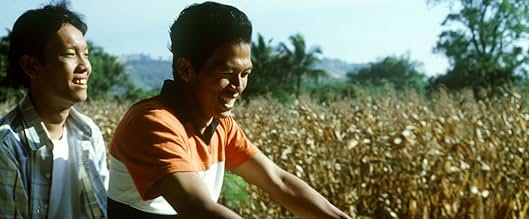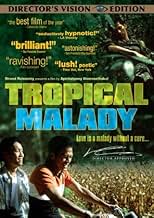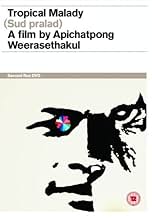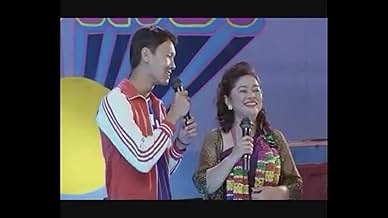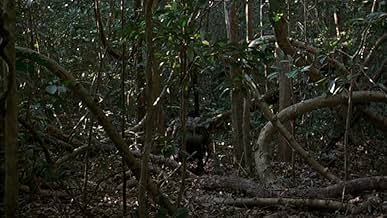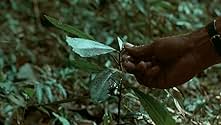IMDb RATING
7.1/10
6.7K
YOUR RATING
A romance between a soldier and a country boy, wrapped around a Thai folk-tale involving a shaman with shape-shifting abilities.A romance between a soldier and a country boy, wrapped around a Thai folk-tale involving a shaman with shape-shifting abilities.A romance between a soldier and a country boy, wrapped around a Thai folk-tale involving a shaman with shape-shifting abilities.
- Director
- Writer
- Stars
- Awards
- 7 wins & 8 nominations total
- Director
- Writer
- All cast & crew
- Production, box office & more at IMDbPro
Featured reviews
10blindg
"Tropical Malady" from the Thai director Apichatpong Weerasethakul, Jury Prize in the last Cannes Film Festival, is a movie that really consume the inside, like a terminal disease. Every senses of your body will be over-excited, there is a TERRIFIC use of sound effects, that will render the tropical forest a living entity, intelligent, thinking, speaking. The contrast between the horrors and anguishes of modern time and the most charming folk legends , that awaken the most genuine human side from the bottom of our hearts is something quite unique and unforgettable.
It's hard to tell about the story without spoil it. Watch it, no matter what.
It's hard to tell about the story without spoil it. Watch it, no matter what.
This film crushed me to the bone, exhausted my heart, and I was never again the same. It brought back faith in the uncompromised vision of cinema. Its images will forever stay in my memory; the stare of the tiger, the smell of the tropical rain...this is sensory cinema, where time is freezed and narrative is stripped, and what's left is for us to finally feel. It is utopian, but it is also sad, because we realize that there is never (and never will be) a utopia. People say love is utopian, yet according to Mr. Weerasethakul, it is also very consuming, which becomes possessive, and at the end, a burden. At the end, the soldier goes into the jungle to find what's been consuming him. The tiger. He is lost and completely hopeless; he has no purpose without the tiger, yet he cannot possibly live with the tiger because of its nature. They are co-dependent; co-exist. Is that what great love is all about?
Having had a good think about the film after seeing it this afternoon, I still can't escape the feeling that there was a really excellent film in the subject matter and narrative elements, but that the director just hadn't quite found a way to get that film to the screen. Instead, he found a film that ultimately taxes most viewer's patience. There were some really lovely elements, I agree, but there is something about the editing that was just this side of over indulgent (and I happen to generally like long, loving, camera shots that are meditative!). The jungle portion of the film, IMHO, suffered from a lack of visual information in most instances (and yet this is one of the strengths of some the individual jungle scenes, like those of the tree, the tiger and ghost ox, where, just because of this unrelenting sameness, stand out marvelously). It could have been half the length and by virtue of that, twice as effective. Having said as much, I look forward to seeing more by this director, he clearly has a head on his shoulders and the courage to tackle difficult (yet rewarding) ideas.
Don't watch alone... I saw this knowing nothing about it as my pal misread the programme for the Toronto Film Festival and our first choice was not on. So, knowing nothing about it I found it lavish but disjointed... a film that frankly missed and which I feel I could have made had I had the budget. It flattered to deceive and did not deliver on its introductory references to the beast in man and the gloss of civilization. Instead we were subjected to a very personal view which failed to communicate to those that did not already know what to expect and therefore, frankly, failed. Having said that it was a great travel movie showing me parts I regret I would otherwise not reach and a brave attempt to make a very un-commercial film about something obviously very personal where the temptation to resist to commerciality or superficiality was clearly resisted
10dvheaton
An exhilarating, confusing adventure. The first half of the film tells a love story, leaving small hints at the ways people can never really know one another. The second half uses a mythic tale and experimental style to explore that theme. It's an attempt to use film and storytelling to portray the feelings and instincts that human beings have but can't find words for. Exciting, but not for those who want everything wrapped up and defined (the film argues against the very possibility of easy definitions). I also highly recommend his two other feature-length films: "Mysterious Object at Noon" and "Blissfully Yours." Hopefully "Tropical Malady" will be released widely enough to get the attention it deserves, and hopefully one day "Blissfully Yours" will make its way to DVD.
Did you know
- TriviaThe same year that this film was chosen to compete at the Cannes, the government sent a delegation of Thai film-makers to the festival. Ironically, when the director asked to be included, officials denied him support, saying that there were no more plane tickets.
- ConnectionsFeatured in The Story of Film: An Odyssey: Cinema Today and the Future (2011)
- How long is Tropical Malady?Powered by Alexa
Details
Box office
- Gross US & Canada
- $46,750
- Opening weekend US & Canada
- $270
- Jun 26, 2005
- Gross worldwide
- $46,750
- Runtime
- 1h 58m(118 min)
- Color
- Sound mix
- Aspect ratio
- 1.85 : 1
Contribute to this page
Suggest an edit or add missing content


